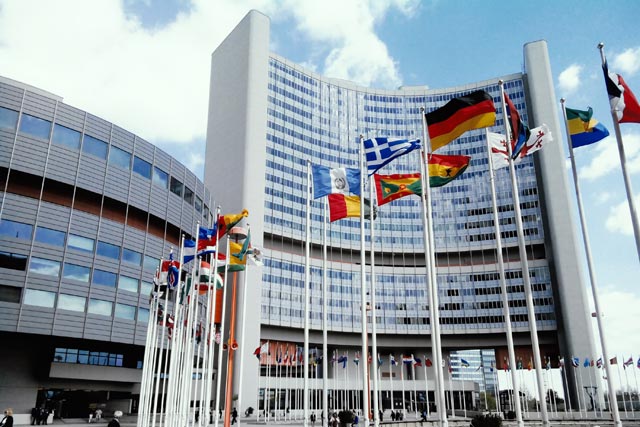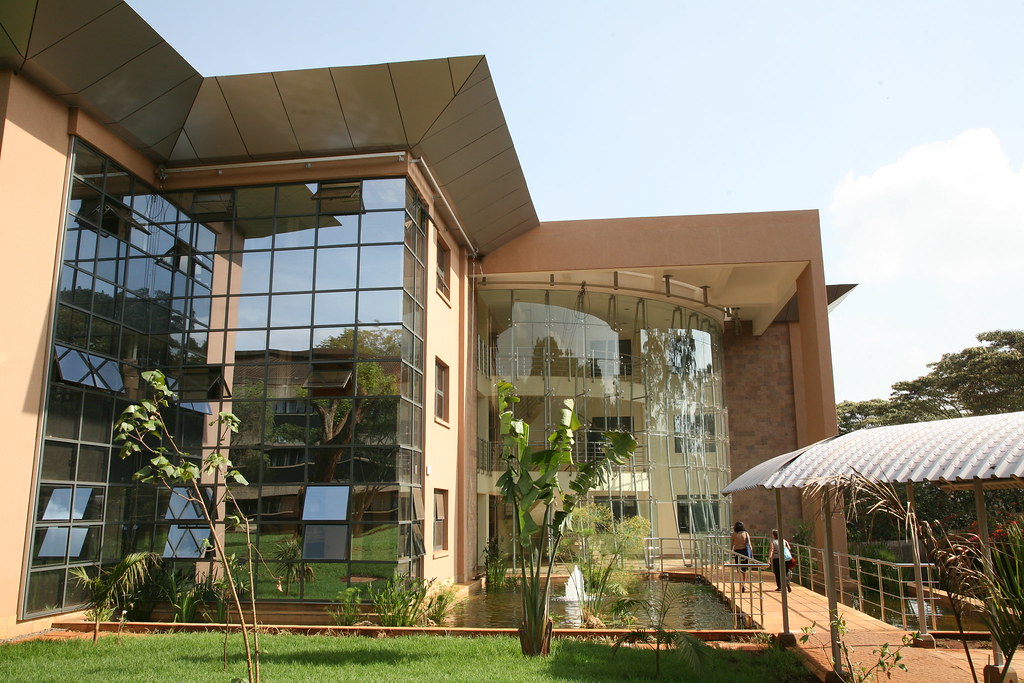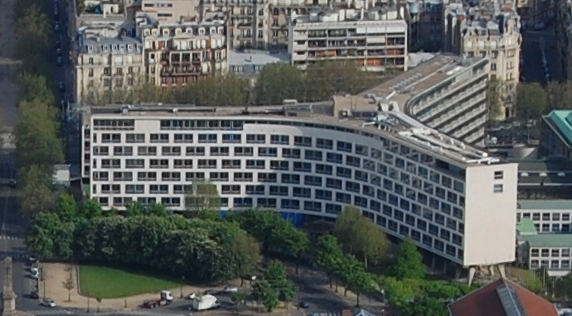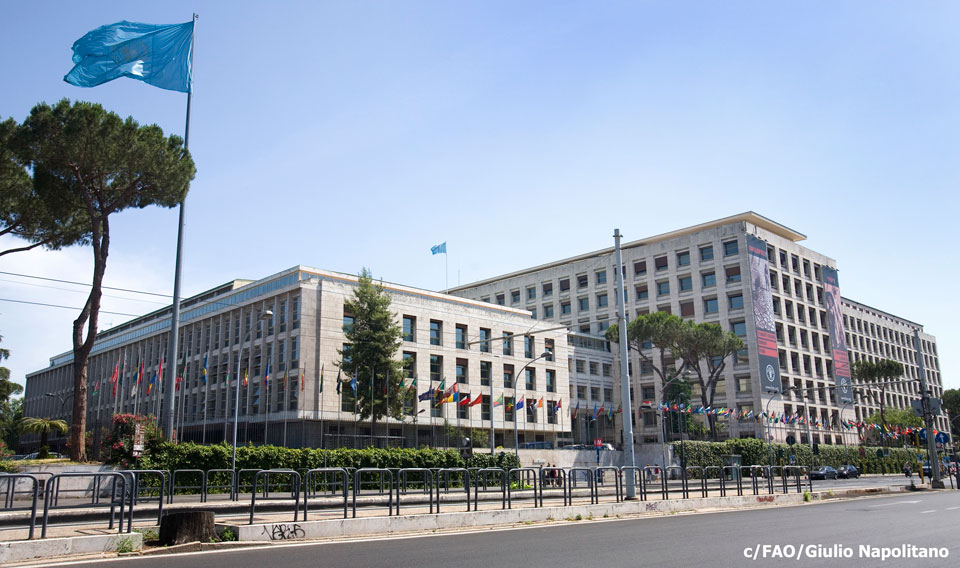Our Voice at the United Nations: SI Dublin Convention 2023
On Saturday 29 July, at the SI Dublin Convention 2023, we heard in depth from our United Nations (UN) Representatives, about their experiences, practice and involvement across the seven UN centres which SI is present. This talk offered quick tour of these seven centres and our UN Representatives’ roles within them, whilst also highlighting the key challenges of operating in such a space and what Soroptimist members can do at the local club level to enhance our voice at the UN.
Want to hear about the activities of our UN Representatives at a specific centre? Follow the links below to jump ahead!

New York
Opening the session, our Global Policy Advisor, Hana Smith, provided an insightful overview of SI’s activities at UNHQ in New York on behalf of our Main Representative at this centre, Bette Levy. As prominent hub for global activities and a home to multiple key UN centres, commissions and associated organisations, New York hosts the greatest number of SI Representatives at one centre, with Bette Levy, Frances Zainoeddin, Jacqueline Shapiro, Maria Fornella-Oehninger and Vanessa Treers all working in collaboration with one another to ensure the voice of women and girls is heard.
During this speech, some of the key issues present in UNHQ conversations were highlighted, including the rollback of women’s rights in recent years, but particularly following the onset of the COVID-19 pandemic. A notable lack of political will among member states was also raised, specifically concerning the push to achieve the Sustainable Development Goals (SDGs) in line with the 2030 agenda for sustainable development. Thirdly, the lack of options for hybrid participation at New York centres was raised, as this presents restrictions on the capacity for representatives from all organisations and civil society to participate at the highest level.
As such, our New York representatives raised an important call for the total and thorough participation of the entire SI network in order to better inform and implement or interventions and statements at UN sessions. Having readily available project details and data remains a serious problem within the UN system, where SI is often using the data we have available in hand and that is often recycled or outdated. Nevertheless, our projects and activities at the local club level afford us with an extraordinary level of access to useful data and information that can be used to support the delivery of SI’s statements, whilst contributing to the overall credibility of our interventions.
This key point was maintained by each of our representatives delivering a talk today, marking a consistent theme and recognised requirement of advocating for the rights of women and girls on the global stage.

Geneva
Discussing the nature of SI’s activities at the UN in Geneva, the second largest UN centre and host to over 7900 meetings a year, SI UN Representative Berthe De Vos provided a breakdown of the specific teams and committees of which our representatives here are part of.
These teams and committees include the human rights council, an important intergovernmental body that oversees the defence and respect of human rights, ensuring that everyone shares and enjoys the same rights and freedoms to the fullest. The Universal Periodic Review was also among these committees, operating as a controlling system where members are reviewed on what they do to respect and employ human rights in their countries.
Additionally, the Committee on the Elimination of Violence Against Women (CEDAW) and the International Labour Organisation are also located here. CEDAW, is an important convention as it works to ensure that member states who have agreed to protect, respect, and defend all human rights, have done so in such a way as to ensure that women and girls are able to exercise and enjoy their human rights and freedoms in the same way as men.
Finally, and providing further support to the call raised by our UNHQ representatives, Berthe advised on the significance of data from projects at club level for their work in Geneva; gathering this information so that our representatives can contribute to UN reports is vital for helping our representatives work together to make the world a better place for women.

Vienna
Summarising the work our representatives undertake at the UN in Vienna, SI UN Representative Marion Prechtl discussed how the team in Vienna continue to raise the voices of Women and Girls at key offices in Vienna. At this centre, the use of technology to improve participation during the pandemic has not been discarded, with many events being held in a hybrid format – allowing for a greater attendance and impact.
The main institution at the UN in Vienna is the UN Office on Drugs and Crime (UNODC), for which Marion explained the action, impact and associations that the work undertaken at this centre has for the mission of SI. In particular, key committees and commissions situated in Vienna, where our representatives are able to make a substantial impact, include the Commission on Crime Prevention and Criminal Justice (CCPCJ) and the Commission on Narcotics and Drugs (CND).
Through its day-to-day operations and key events, UNODC covers a broad range of issues under the topic of drugs and crime, addressing criminal acts which affect women and girls, such as trafficking, substance abuse, domestic violence, environmental mistreatment and many others. Special conferences also take place throughout the year on relevant and current issues, such as the presence of corruption, as well as how to use data to combat corruption in different contexts.
Furthermore, this office focuses beyond only tackling criminal behaviour and also considers the victims, such as those who flee conflict, those who are in prison or are who are otherwise exploited, as well as addressing the treatment of drug abuse around the world and the treatment of drug addicted persons. The medical side of things is also considered, such as the trade of medical products and how medicine can be accessed by those who need it.

Nairobi
Speaking on behalf of our SI UN Representatives in Nairobi, Mary Muia and Betty Oluoch, SI Global Policy Advisor, Hana Smith, provided insight into the work of SI undertaken at the UN offices in Nairobi, which is home to the UN Environment Programme.
This centre focuses on key environmental issues and related topics, whilst offering a space for SI to collaborate with other stakeholder groups for action toward social, environmental, and economic empowerment and justice.
The umbrella topic of environment is broad and the issues addressed under it are equally so, with the regular consideration of relevant issues, including: the changing climate and its threat to the environment, peoples, and biodiversity, as well as habitat destruction and the exploitation of resources, as well as the impact that this has on the livers of women and girls who require these resources and spaces to thrive. Additional topics considered here involve pollution and waste, such as that which relates to the water, land, and air in equal measure, as well as resource depletion – including unsustainable business practices which exacerbate social and economic inequalities.
Nairobi is also home to the United Nations Environment Assembly, which is the world’s highest-level decision-making body on the environment. Many meetings and conferences take place here throughout the year, meaning there are frequent opportunities for our representatives to deliver comprehensive statements and validated position papers. Furthermore, the introduction of hybrid participation in events and sessions has meant Mary and Betty are able to attend more easily and often than before, taking advantage of digital tools and resources to do so. The high influx of other global organisation and their representatives also means that our representatives here can efficiently network, contributing to other working groups and keeping up to date on relevant reports and issues of concern.

Paris
Our team of UN Representatives in Paris consists of Evelyne Para, Marie-Christine Gries and Rina Dupriet, who participate throughout the year on various commissions, national days, forums and committees at the UN Education Science and Culture Organisation (UNESCO). From the Paris team, Evelyne Para spoke on the important work our representatives undertake at this UN centre and the challenges which lie ahead.
In order to expound on the topics covered at UNESCO, Evelyne referred to three key themes throughout her talk – namely, SDG 4 (Quality Education), SDG 5 (Gender Equality), as well as Digital Technology and Education, all of which acutely inform the work of our representatives at UNESCO, as well as all over the world.
On the theme of Digital Technology and Education, there have been real advances made in the past 25 years, particularly concerning the participation of women and girls in higher education, which has tripled in the years following the introduction of new technologies for learning. Furthermore, the learning outcomes of girls are improving at a faster rate than those of boys – nevertheless, many global challenges lie ahead.
Many children and young people are out of school, whilst many others can’t read or write. This is not an issue that can be easily resolved, and one that disproportionately impacts young women and girls. Additionally, the COVID-19 pandemic has further established this challenge, especially for the poorest households in rural parts of the world, where progress toward SDG 4 and SDG 5 has been limited due to the digital divide.
Here, Evelyne referred to the key efforts made through UNESCO in order to guarantee the fundamental right of education for all. Established during the pandemic, UNESCO has mobilised a global coalition for education – fostering a real platform for collaboration and exchange, for learners, teachers and collaborators.
Women are also being trained for a digital future. The automation of low-skill jobs has increased in recent years, meaning opportunities for productive employment for women will gradually disappear. Women should not miss out on these jobs.
At this point in time, it is therefore important to question whether we are prepared for this professional revolution and consider what can be done to close the digital divide. This is the focus of our representatives at UNESCO.

Rome
For our SI UN Representative, Liliana Mosca, at the Food and Agriculture Organisation (FAO) in Rome, a summary of our representatives’ activities and involvement at this UN centre was provided by Donatella Benjamin of the UN Geneva team. The FAO is a specialised agency of the UN that leads international efforts to eliminate hunger – in particular, their goal is to achieve food security for all and to ensure that all people have regular access to enough high-quality food to lead active and healthy lives. SI made our first application to the FAO in 1988, after which we became a silent observer in 1999, before taking on a representative role at this centre.
In Liliana’s capacity as an SI UN Representative, she is involved in many commissions, including the Civil Society and Indigenous Peoples Mechanism (CSIPM) as well as the NGO Group at the FAO. The latter of these is an ad hoc group which belongs to the long history of the FAO, collaborating with non-state actors and playing a role in raising awareness, stimulating projects and programmes, and mobilising resources.
The FAO activities are organised around five strategic objectives, with the aim to align efforts, improve coordination to achieve results in major areas, and consider that governance, nutrition and gender issues are interconnected, particularly in relation to the FAO’s objectives, which are:
- Eliminate hunger, food insecurity and malnutrition
- Ensure sustainable agriculture, forestry and fisheries
- Reduce rural poverty
- Enable inclusive and efficient agriculture and food systems
- Increase the resilience of livelihoods to threats and crises
The FAO strategic framework seeks to support the 2030 agenda for sustainable development through the transition to more efficient, inclusive, resilient and sustainable agri-food systems for better production, nutrition, environment and a better life leaving no one behind.
Lastly, SI has three major goals at this UN Centre. The first goal is to achieve consultative status at the FAO, which is different to what we have already achieved at other UN centres; secondly, is the goal to be granted with entry badges and passes to improve the scope of our participation here; thirdly, is SI’s participation at the biannual FAO regional conferences, which are held every two years in Africa, Asia Pacific, Europe, Latin America and the Caribbean, the Middle east and North Africa. These conferences, where member countries establish priorities for the FAO’s work in each region, providing scope for stronger partnerships between SI and other organisations that share our mission and goals.

Bangkok
The final UN centre to be addressed during this session was the UN centre in Bangkok, Thailand, where SI Representative Theresa Devahasayam works to raise our organisation’s profile in the international society. Speaking on behalf of Theresa at the Dublin Convention, Marie-Christine Gries provided a summary of the key activities and challenges involved in being a representative at the UN in Bangkok.
Our contribution to meetings at the Economic and Social Commission for Asia Pacific (ESCAP) is significant due to our work undertaken at the grassroots level. However, one specific challenge at this centre has been managing the link between our club projects at the local level and the SDGs; it is important that we endeavour to serve the local communities that our projects impact and ensure that our projects are more explicitly aligned with the SDGs. In this way, SI operates as a bridge between local communities and the international community.
From Theresa’s contribution to meetings and events at UN Bangkok, it is clear there is enormous interest in our work among other participants – these sessions provide a powerful opportunity to showcase our projects and have been successful in raising our visibility in the international community.
This year, our participation at ESCAP provided one of the few voices from civil society at this important conference – with this in mind, it is vital that we maintain our status as civil society actors who advocate for all women and girls. SI is in a privileged position at these conferences – we have a platform, with being an international women’s organisation, to ensure that our governments are aware of the inequalities exercised at a local level.
Nevertheless, and echoing the comments of our other SI Representatives at UN centres, our advocacy can become much more impactful if we had access to more concrete data from our clubs and projects. This is a challenge that we all face.

